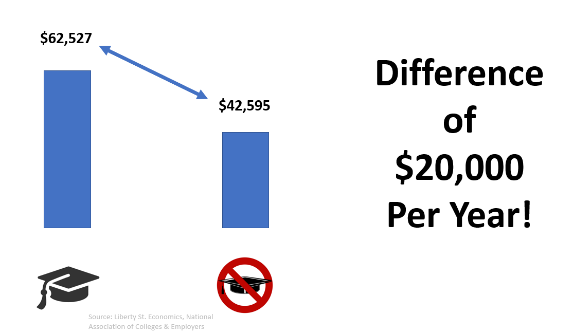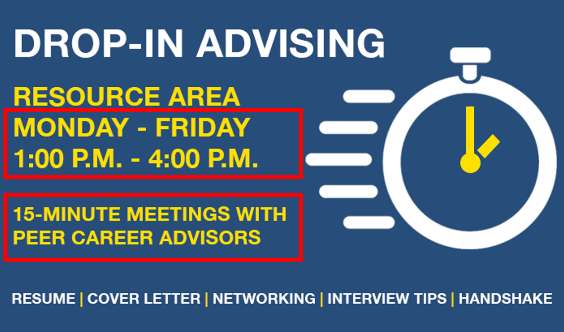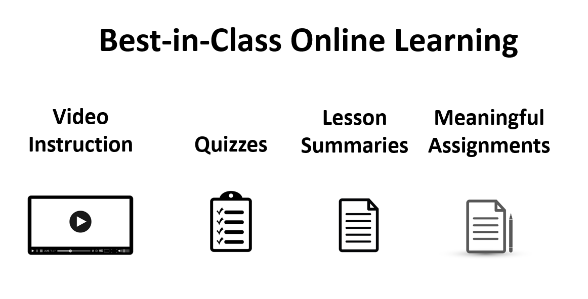Job Search Training for College Students
A Step-by-Step Guide to Getting a Great Job After College (in Just 30 MInutes/Day)
Advanced Job Search Training for College Students.
A Step-by-Step and Word-by-Word Guide to Getting a Great Job After College.
Just 30 Minutes Per Day.

Let’s face it.
Colleges are very good at teaching the skills required to DO a job.
On the other hand, colleges are usually terrible at teaching the skills required to GET a job.
A Bachelor’s degree includes 2,000 hours of classroom instruction. How many of those hours do you think they devote to teaching job search skills?
Virtually none!
Even though you can’t possibly do a great job until you get a great job.
That's why we teach this course.
We Teach the Skills Students Don't Learn In College.
This program was developed exclusively with college students in mind. It teaches them how to get a job.
And not just any job. A great job. Whether you’re a Freshman seeking that first internship, or a Senior or even a recent Grad ready to get that first full-time position.
Our training is delivered in a comprehensive, sixteen-module course. It delivers a step-by-step approach to best-in-class resume writing, networking and interview skills.
But it also covers so much more.
That’s because finding a job today is different -- and more complex -- than it was a generation ago.
That's why this course includes advanced insights into the modern job search.
These insights include:
Where to find the best jobs posted online.
How to also find jobs that are never posted online -- more than half of all jobs!
How to find someone who will recommend you for a job that isn't posted online.
How to design a resume that beats the computer screeners (which reject 90% of resumes) and gets into the hand of a real person.
How to prepare not only for face-to-face interviews but the increasingly common video interview as well.
How to turn challenging interview questions like “Why should we hire you?” or “What’s your biggest weakness?” into a competitive advantage.
How to negotiate a bigger salary, using information that’s already available on the internet.
We're committed to providing a complete and comprehensive job search education.
Parents Don't Realize This is Such a BIG Problem.
For years, parents assumed that once their son or daughter made it into college, they were all set.
A bachelor’s degree was the golden ticket. Good grades = good job.
Things sure have changed.
Here's a typical story.
It begins with this congratulatory Facebook post that I received in my newsfeed:
It came from a good friend. She was obviously really proud of her son. As she should be. He'd just graduated from a very good college with a fabulous GPA.
I was happy for her. I reached out to offer congratulations.
She responded right away with a big “thanks”. She then mentioned that finding a great job was his next step.
I offered to be of assistance. She appreciated the offer but said that they weren't worried. She mentioned that he interviewed for a couple of jobs while still in school. While he didn’t get either one, the fact that he got the interviews felt like a good sign to them.
I wished them luck.
Then crickets. Radio silence. I didn’t hear anything about him for weeks.
Several months passed.
I grew curious. Finally, after six months, I reached out to her.
Instead of responding via Facebook, this time she just called. She was down. Really down.
Her son had been looking for a job for a full six months. He still hadn’t received a single decent job offer.
She was stunned. She literally couldn’t believe it.
She felt like his job applications were just going into a big black hole.
On the rare occasions when he actually got to talk to a real person, it seemed they ended up hiring someone with more experience instead.
He'd started working part-time as a waiter to make ends meet. He didn’t want to have to move back home. Plus he had student loans to repay.
Needless to say, he was depressed. And embarrassed.
She just couldn’t understand why a great kid with great grades from a great school couldn’t get a great job.
Apparently, a lot of his friends were running into similar challenges. Some of them even moved to new cities to find the jobs they wanted.
He wasn't sure what to do at this point. What if he was unable to find a job after 12 months?
Should he consider going back to grad school? That idea wasn’t very appealing. He already had a pile of student debt to pay off.
The thrill of graduation felt like a distant memory.
Why is it So Hard to Get A Good Job?
What's going on?

Isn’t the economy supposed to be growing? Isn’t unemployment supposed to be down?
Yes, unemployment is down. But unemployment isn’t really the issue.
The real issue for college grads today isn’t unemployment, it’s under-employment.
College grads can always find a job. The problem is finding the job they want.
The problem is that competition for good jobs has increased.
A generation ago, less than half of all high-school students went on to college. Just 40%.
Now that number is 70%. That’s right. The majority of high school grads now go on to earn a college degree. A full 70%.
A four-year degree is clearly no longer the golden ticket that it once was.
In fact, there are now more college grads than jobs that require college grads.
That’s a big shock. Especially if you are investing $100,000 or $200,000 in a Bachelor’s Degree. Or even more.
But facts are facts.
And it’s now a fact that getting accepted into a great company is harder than ever before.
It's Much Easier to Get Into a Great College Than Into a Great Company.
Don’t believe me? Let’s look at acceptance rates.
What’s the most selective college out there?
If you guessed Harvard, you’re right.
Harvard accepts only 6% of all applicants. That’s 6 out of every 100.
Those are pretty long odds.
OK, so now let’s look at some acceptance rates for some great companies. Like MetLife. Or J&J. Or Google.
How hard do you think it is for a college grad to get accepted into one of these companies?
You’re going to be surprised.
MetLife accepts only 1.5% of all college applicants.
J&J accepts only 0.5% of all college applicants. That’s one acceptance for every 200 who apply.
Google accepts only 0.2% of all college applicants. That’s just one acceptance for every 500 who apply.
Yikes.
So it’s actually four times harder to get a job at MetLife than it is to get into Harvard.
And it’s an amazing thirty times harder to get a job at Google than it is to get into Harvard.
(Don’t forget. Getting into Harvard is hard!)
The job market for college grads is nuts. Even if you have a “hot” degree like computer programming or engineering, it’s very competitive.
It’s simply a matter of supply and demand.
So What Does This Competition Mean For Our Students?
Sometimes it means they’re not getting into the company they want. Sometimes it means they’re not getting into the industry they want. Sometimes it means they’re not even getting a job that requires a bachelor’s degree.
That’s right. College grads are taking jobs that don’t even require college degrees.
And here’s something you may find even more surprising.
It’s not just “some” grads.
That’s because, in today’s market, most college grads -- a full 52% -- are now taking jobs that do not require a bachelor’s degree.
That probably shocks you. I can assure you that it shocks them.
So what kind of “non-college” jobs are these grads taking?
Lots of recent grads are taking low-level clerical jobs. These jobs often come with titles like:
Many other grads are taking low-level service jobs instead. Sometimes just to make ends meet.
Would it surprise you to learn that:
These grads surely didn’t go to college expecting to become a Receptionist, Administrative Assistant or Bartender.
Obviously, that’s an unpleasant surprise.
You know what else is unpleasant? The salary they’re earning as a result.
That’s because, on average, they’re making $20,000 less per year than they should be.
That’s correct. Jobs that don’t require a college degree pay around $42,595 per year, on average.
Jobs that do require a college degree pay around $62,527.
That’s a huge difference – $20,000 – that really adds up over a couple of years.

Don't Panic - There's Good News!
Does this situation feel hopeless?
Well, there’s good news. It doesn’t need to feel that way.
Yes, the market for good jobs is competitive.
But students aren’t losing out on these jobs because they’re less qualified to do them.
They’re losing out on these jobs because they haven’t been trained to find and compete for them.
Because great job search skills are in such short supply, students who have them always beat out students who don’t.
Students with great job search skills know how to:
Find the jobs that aren’t posted – more than 50% of all available jobs!
Write resumes that beat the computer screener, and make it past HR.
Identify and present their most compelling, relevant accomplishments.
Turn brutal interview questions like “Tell Me Why We Should Hire You” into a competitive advantage.
No wonder they get good jobs.
Why Career Centers Aren't Enough
Now I know what you’re thinking. How about career centers?
Aren’t college students supposed to learn everything they need to know about the job search in the career center?
I have nothing against career centers. As a matter of fact, I strongly suggest that students exhaust every possible resource that their career center provides.
But here’s the problem. Career centers are understaffed.
On a nationwide basis, colleges provide just one counselor for every 1,889 college students.

No wonder that more than half of all college students graduate without ever visiting their career center.
Here’s another problem. Career centers don’t provide structured, comprehensive training on the job search.
Here’s an example of a posting at a major university.

Drop-in services. 15-minute sessions.
Probably showing you how to format your resume or reminding you how to dress for an interview.
Colleges are obviously capable of providing comprehensive, in-depth classroom training.
They do it superbly for an amazing range of subjects – from English to Chemistry to Economics.
As a matter of fact, many colleges even provide comprehensive, in-depth training for a range of subjects you might value less – including History of Film, Watercolor Painting and French Popular Culture.
(These are actual college courses pulled straight from the catalog of major four-year universities!)
So why aren’t they devoting similar classroom resources to adequately prepare students for the rigor of the job search?
Not sure. But they don’t.
That’s why we introduced the Advanced Job Search Skills Training Program.
What Makes Our Training Program So Valuable?
The Advanced Job Search Skills Training Program is a comprehensive, proven 16-week training program.
It was created specifically to address the unique needs of college students.
This program includes every single piece of learning that a college student requires for a successful job search.
With simple-to-understand tools, templates and step-by-step instructions.
All of this information is delivered through highly engaging videos, quizzes, and assignments.

In fact, students tell us that this is the only class where they actually can leverage every homework assignment. There's no "make work".
We also teach this subject the way today's student wants to learn, at their own pace and on their own schedule.
This kind of learning is so convenient that students can even do it on their cell phone -- often between other classes -- in just 30 minutes per day.

16 Full Weeks of Comprehensive Training
Simple Step-By-Step Instructions & Templates
We've designed every training module with simple step-by-step instructions.
Take something as simple as an elevator pitch, covered in Module 1 of the training.
You can’t possibly conduct a successful job search if you’re not able to give a stranger a 30-second summary of your interests and ambitions.
Yet 95% of college students aren't able to do it.
As with everything we teach in this course, we make it simple.
We help students understand why they need an elevator pitch.
We teach them how to structure their pitch.

And of course, we provide a simple template – filling it in with multiple examples.
We Don't Just Preach. We Teach.
We don't skip the tough subjects.
We even teach students how to master the most important – but also the most intimidating – aspect of any job search.
Networking!
Every career center stresses the importance of developing a great network.
No one tells you how to do it. We do.
Knowing how to network is critical because over half of all available jobs are never even posted. Companies increasingly are relying on employee referrals to find great candidates.
If you and your accomplishments aren't known by these employees, you’ll never get recommended.
And that cuts out at least one-half of all your potential opportunities.
But we get it. Networking feels intimidating. Like this:

I know. I grew up as an introvert. And here’s a surprise. I’m still an introvert. And yet I’ve developed first-class networking skills that we’re able to teach in this course.
Networking should feel like a conversation where ideas and assistance are exchanged. It should feel like this:

We start the process by giving students tools to use for networking.
Networking isn’t about being naturally social, it’s about following a structured process, guided by tools.

These tools are the best, and they aren’t taught this way elsewhere.
But we don’t leave students hanging with just the tools. We continue their road to mastery with many specific examples and word-by-word scripts they can use to facilitate the networking process.

There’s just no way that students are going to learn this stuff on their own.
Or through a series of 15-minute visits to a career center.
Just like they’re not going to learn Economics or Chemistry or Engineering that way. This type of learning requires structured instruction.
Learning how to find a job is one of the most important things a student can accomplish while in school.
Knowing how to find and compete for great jobs has always been challenging.
Modern Technology Makes the Job Search More Challenging
Take online job postings as just one example. Don't online postings make finding a job easier, not harder?
In a sense, they do. And that’s part of the problem.
Because it’s so easy to find and apply to online jobs, they’re literally swamped with applications. Often 1,000’s. Those are stifling odds.
How do you think companies are screening all those resumes? If you guessed computers, you’re right.
You now need to know how to design your resume to get past a computer.
The computer rejects 90% of resumes based on bad formatting, too many keywords or too few.
Assuming you’re one of the lucky 10%, this same resume must then clear Human Resources. HR then rejects 90% of the remaining resumes that the computer doesn’t reject.
And you know how many seconds HR takes to review each resume? About 6. Seriously. It’s been studied.
Making things even more complicated is the fact that less than half of available jobs are even ever posted.
To find these jobs, you need to become a detective. You have to build a network. You need to meet and appeal to people who can and will recommend you for these unlisted jobs.
Not Just Interview Tips - Comprehensive Interview Skills
More than ever, you need a powerful network – not just to get your first job but to establish a successful career.
Of course, then comes the interview. Can you think of anything else that’s more intimidating?
Do you think college students are born knowing how to answer “Tell Me About Yourself” without rambling on?

Or to respond to “What’s Your Biggest Weakness” with confidence?
Or to prepare themselves to intelligently answer “What Do You Think Makes Our Company Better Than the Competition”?
Or that they understand the differences between preparing for an in-person interview, and the increasingly common video interview?

These are the skills you don’t just learn by reading a pamphlet. Or perusing a website. Or visiting briefly with your Career Center.
These are challenging skills that must be taught via a structured, interactive program.
A Small Investment With a Huge Payback
Let’s say your college put together a program like this one. What do you think it might cost you?
Well, here’s a back-of-the-envelope calculation.
Each year students take about 10 classes.
So if you’re paying $25,000 per year, each class is costing you about $2,500.
And if you’re paying $50,000 per year, each class is costing you about $5,000.
Guess what the comprehensive training program that I’ve already described will cost you?
Just $975. That’s less than you’d pay for the newest iPhone.
For that price, you get the entire 16 module program.
This comprehensive training program includes all the videos, templates and quizzes I’ve already described. It literally includes everything your student needs to know about the job search.
I’m sure you’ll agree that’s an amazing deal for just $975.
But if you’re hesitant, think about the payout that this course can deliver.
Let’s say this course helps your student get a job faster. Let’s be conservative and say this course gets you a job just three months faster.
You know what that’s worth?
It’s worth a full $15,000, assuming the job pays $60,000 per year.
And getting a job faster is just one benefit of the course.
The real benefit is getting a better job. A job that requires a college degree. With a great company. In a great location.
What’s that worth?
Most likely around $20,000.
But here’s the kicker. Getting a better job is actually worth more than that. Why?
Because your first job sets the standard for what the market thinks you’re worth. When you switch jobs – something today’s grads will likely do 15 to 20 times over a career – your new salary is negotiated based on your old salary.
If you’re making $40,000 you’ll get a bump on $40,000. If you’re making $60,000 you’ll get a bump on $60,000.
So that $20,000 difference actually sticks with you over the course of your career. Because the first job sets the baseline.
That can add up to big money. A $20,000 difference over the course of a 25-year career could mean an extra $500,000!
All for an investment of $975.
FREE Bonus Items!
We obviously want you to act now. Why wait? So we are providing an extra incentive.
If you purchase our program before your deadline, you will receive four additional bonus items. All at no incremental charge, simply for signing up.
The first bonus item is an exclusive summary of Starting Salaries for 50 Popular Majors.
This is a fascinating resource that will give you a sense of what companies are paying recent college grads, by major.
These range from $41,656 for a Social Work Major to $52,020 for an Accounting Major to $70,120 for a Computer Science Major.
The second bonus item is a great value-added item as well, 12 Secrets to Get Your Resume Past the Computer Screener.
This essential document teaches you how to select the perfect keywords.
The ones that the screener has been programmed to identify.
It teaches you how to select the right format.
More importantly, it teaches you how to avoid formats that computers can’t read.
And it gives you insight into other factors (e.g., keyword stuffing) that can get your resume bounced.
The third bonus item is a summary of The 10 Largest Executive Search Firms.
Sometimes companies will outsource the task of filling a job to an Executive Search Firm, especially for important jobs.
These jobs are never posted! That’s because the company is paying someone else to do the heavy lifting of identifying great candidates.
It’s important to get known by these recruiters over time, as you’ll want them to pitch you on their most interesting opportunities.
Finally, the fourth bonus item is often the favorite. It's a list of The 40 Best Places to Work.
Why wouldn’t you want to target companies where employees are already motivated, satisfied and happy?
Because the employees themselves vote for this list, so you know it’s legit.
Would it surprise you to find out that AirBnB is #35 on the list?
Or that In ‘n’ Out Burger is #7?
Or that Facebook is #2?
Bet you’re curious to find out who is #1!
As a reminder, you’ll receive all four fantastic bonus items absolutely free, immediately after you register for our program.
But it is a limited time offer, so you need to sign up before your deadline expires.
Sign up today and receive the following four VALUABLE resource documents as a FREE BONUS with your purchase:
Student Testimonials
We believe we’ve put together an amazing program.
But don’t just take our word for it. Here’s what actual students have to say:

I can’t believe the internship I just got. I also can’t believe I found it via networking. There’s NO way I would have done any of that networking stuff without this course. The tools and scripts make it easy.
Jessica T.
My job is awesome. I love it. I feel lucky. I didn’t know anything about job search before I took the course. Most of my friends are having trouble, so I’ve recommended the course to them.
Michael W.
This was just like taking another college course. Except better, since you’re learning something you’ll definitely use. I can say for certain that customizing my resume got me this job, and I love it.
Daniel R.
Searching for internships was making me feel like a failure. And I’m a great student. Our career center covered the basic stuff but didn’t teach you the skills and secrets required to get a great job like this course did. Thanks!!
Sofia E.
Curious What Parents Think As Well?
This course is designed not only to provide great value but to give you peace of mind as well.

When my eldest son went off to college and declared his major, I assumed he was set and would graduate with a great job. I sure was wrong. The problem is that it is a lot tougher to get a job than when I went to school. The kids need extensive training. That’s why I signed my youngest up for this course. He’s the only kid his age who has developed a Networking Document. He feels way ahead of the game and already landed his first internship. Whew!
I was a bit suspicious about online training, but this course proved me wrong. Very professional. Great power-point guided training. Good insights. Good pacing. Well thought out and structured. Great investment.
I wanted to help my son with his job search but didn’t know how. He wanted to do things on his own. (Or not do them.) Plus, he felt my advice was dated. This course proved to be the perfect way for us to engage. It was a great wake-up call for him. He learned things he’ll use his entire career. He just landed a fantastic job, so we couldn’t be more pleased (and relieved)!
30 DAY MONEY-BACK GUARANTEE
Your Purchase is Risk-Free
This Investment Pays Back Quickly
Advanced Job Search Skills is the perfect complement to any student’s undergraduate learning program.
It covers everything you need to know. Plus, with just 30 minutes of effort per day, it will teach students how to:
This Advanced Job Skills Course is the perfect supplement to a college education.
Colleges teach you how to DO a job. This course teaches you how to GET a job.
Both are lifetime skills.
This course will add value even if your student is introverted. I was actually an introvert. I still am. And yet, I've developed an amazing network that I've been able to leverage again and again. It's really about learning how to use the tools.
This course will add value even if your student has a HOT major, like computer programming or engineering. Yes, students with these majors typically get high-paying jobs. But don't kid yourself. The market is very competitive. The very best jobs don't necessarily go to the best students, they go to good students with great job search skills.
This course will add value even if your student hasn't yet declared a major. Developing the skills required to DO a job are different than developing the skills required to GET a job. You'll need both, but they don't need to be done in sequence.
This course will add value even if your student just graduated from high school. It's never too early to learn job search skills. It's also never too early to start thinking about internships, the #1 factor in getting a good job after college. The skills required to get a full-time job are the same skills required to get an internship.
This course will add value even if your student has already graduated. Don't worry. Only 14% of students graduate with a job. And even if they've taken a job that doesn't require a college degree, this course will teach them how to get out of that trap.
Money-Back Guarantee
On top of everything else, this investment is entirely risk-free.
That's because we provide a 30 Day 100% Money-Back Guarantee.
No questions asked.

You have nothing to lose and everything to gain!
Sign up today and receive the following four VALUABLE resource documents as a FREE BONUS with your purchase:
Frequently Asked Questions

Should we wait until after graduation to do the training?
Absolutely not. While it’s never too late to start, we recommend starting the program as a Freshman and even earlier, if possible. Learning how to search for a job is just like learning any other skill. The more you practice a skill, the better you get. The more you practice your job search skills, the better you get and the larger your network grows.
Additionally, Freshmen need to start thinking about summer internships. The skills required to find a job are the same as the skills required to find an internship.
Do we really need this training if our student has a “high demand” major like engineering or computer science?
Absolutely. While STEM majors are currently in high demand, the best jobs at the best companies are always extremely competitive. Having great search skills will not only help you to better compete for the jobs that everyone sees, it will help you find jobs that no one sees because they aren’t yet listed.
Something else to consider is that this course doesn’t just teach you how to find a great job, it teaches you how to negotiate a great salary. That’s important for everyone.
Finally, don’t forget that you can expect your student to switch jobs about 15 – 20 times over the course of a career. Knowing how to do the search well is a lifelong skill that will be utilized many times.
Can’t they just learn this stuff in the career center?
Most career centers are poorly staffed. Nationally, there’s 1 counselor for every 1,889 students. That’s probably why over 50% of students never visit the career center.
Given this constraint, career centers tend to provide quick tips rather than comprehensive, detailed, classroom-style learning we provide.
How long are the materials available?
All the materials are available for a full 12 months after registration.
When does the program begin?
The program begins as soon as you sign up. Simply have your student use the login information you've created. It is a self-paced course.
Do you offer a money-back guarantee?
Yes. We offer a full 30-day money-back guarantee if your student isn’t satisfied with the quality of the materials.
We’re pretty sure your college doesn’t offer a money-back guarantee if your student doesn’t like a class, so this is a pretty good deal.
How long does the course take to complete?
Pacing is up to your student, as learning is always “on-demand”.
We suggest allocating a full sixteen weeks for completion, a week per module.
Getting Started Survey
Welcome! (1:52)
The Job Market is Competitive (6:09)
Here's What You'll Be Learning (10:09)
Getting Started Takeaways & Assignment
What's An Elevator Pitch? (5:14)
Elevator Pitch Examples (3:15)
Elevator Pitch Examples
Elevator Pitch Key Takeaways
Elevator Pitch Assignment (2:02)
Create a Job Fair Pitch (3:53)
Job Fair Pitch Examples (5:26)
Elevator and Job Fair Pitch Quiz
Job Fair Pitch Key Takeaways
Job Fair Pitch Examples
Job Fair Pitch Assignment (2:25)
Why is Networking So Valuable?
An Amazing Networking Story (3:10)
How to Create a Networking Document (6:45)
Networking for Career Advice
Networking Document Examples
Networking Document Quiz
Networking Document Key Takeaways
Networking Document Assignment
How to Create a Target List (4:57)
How to Request a Meeting (4:44)
How to Conduct a Meeting (5:29)
Networking Meeting Guidelines
Target List Example
Networking Meeting Key Takeaways
Networking Meeting Assignment
How to Structure Your Resume (5:22)
Step-by-Step Resume Instructions (10:14)
What if I'm Just a Freshman? (5:15)
Resume Examples
Resume Quiz
List of Action Verbs for Resume Accomplishments
Resume Key Takeaways
Resume Assignment (1:23)
What's the Difference Between a Resume and a Profile? (4:15)
How Do I Create an Amazing Profile? (14:05)
LinkedIn Profile Quiz
LinkedIn Profile Key Takeaways
LinkedIn Profile Assignment (1:25)
How Do I Network on LinkedIn? (4:29)
How Do I Reach People Without a Connection? (2:44)
LinkedIn Network Key Takeaways
Linkedin Networking Assignment (1:13)
Why is Work Experience So Essential? (6:26)
How Do I Find Work Experience? (5:02)
Work Experience Key Takeaways
Work Experience Assignment (0:49)
How to Find Activities That Fit Your Career Direction? (11:07)
How to Leverage Activities as Meaningful Experience? (6:20)
Internship & Extracurricular Activities Quiz
Extracurricular Activities Key Takeaways
Extracurricular Activities Assignment (1:50)
How to Avoid Personal Sabotage? (4:06)
Avoid Personal Sabotage Key Takeaways
Online Image Assignment
How Do I Find Traditional Job Listings? (4:48)
How to Network for Job Listings? (6:00)
Find All the Job Listings Quiz
Find All the Job Listings Key Takeaways
Find All the Job Listings Assignment (0:56)
How Customization Breaks Through the Clutter (3:24)
How to Easily Customize Your Resume (5:12)
The Simple Way to Write an Engaging Cover Letter (6:21)
Cover Letter & Custom Resume Quiz
Cover Letter & Custom Resume Key Takeaways
Cover Letter & Custom Resume Assignment (1:31)
What Pre-Interview Research Should I Do? (5:31)
Pre-Interview Research Quiz
Pre-Interview Research Key Takeaways
Pre-Interview Research Assignment (0:58)
What Types of Interview Questions Will I Get? (2:37)
How to Answer "What's Your Story" Questions? (6:39)
How to Answer "Company Research" Questions? (3:15)
How to Answer "Self Awareness" Questions? (5:25)
How to Answer "Examples of Behavior" Questions? (3:45)
Toughest Interview Questions Quiz
Toughest Interview Questions Takeaways
Toughest Interview Questions Assignment (3:56)
How Should I Prepare for the Interview? (2:52)
Planning for Interview Logistics (7:25)
How to Handle Video Interviews? (3:03)
Interview With Confidence Quiz
Interview With Confidence Takeaways
Interview Techniques Assignment (1:20)
How to Handle the Offer Discussion? (4:43)
How to Research the Offer? (9:39)
Evaluating Simultaneous Offers (4:01)
Negotiate Your Best Offer Quiz
Negotiate Your Best Offer Takeaways
Negotiate Your Best Offer Assignment (1:53)
Bonus Materials Overview
Best Job Search Sites for College Students
The 40 Best Places to Work
The 10 Largest Executive Search Firms
12 Secrets to Beat the Resume Screeners
Starting Salaries for 50 Popular Majors
Feedback
Sign up today and receive the following four VALUABLE resource documents as a FREE BONUS with your purchase:
*** FREE GIFT! ***
Did you just participate in our webinar - The 9 Reasons College Grads Don’t Get The Job They Want (And What Parents Can Do to Help)?
If you didn't and would like to see the webinar, click here.
If you did and would like to claim your FREE PDF just click on the link below to download your copy:
THE BEST ONLINE JOB SEARCH SITES FOR COLLEGE GRADS.pdf